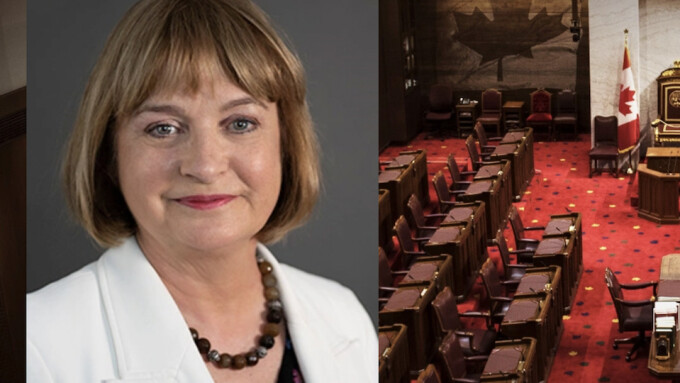OTTAWA — A Canadian senator and anti-porn crusader who has collaborated with religiously motivated U.S. conservative groups has inserted a controversial amendment into a pending bill, requiring platforms to enact age verification systems if they allow any depictions of sexual content.
Sen. Julie Miville-Dechêne (Independent, Quebec/Inkerman) on Tuesday persuaded a Senate committee to amend Bill C-11, a broadcasting regulation bill proposed by the ruling Liberal government of Justin Trudeau.
Miville-Dechêne’s amendment, Canada’s National Post reported yesterday, “added the requirement for online platforms to verify the age of users accessing pornography, a move internet law experts say is likely unconstitutional.”
Miville-Dechêne's amendment mandates that “online undertakings shall implement methods such as age-verification methods to prevent children from accessing programs on the internet that are devoted to depicting, for a sexual purpose, explicit sexual activity.”
The law offers no specific guidelines for implementing its age verification requirement, and — like similar measures endorsed by the Canadian Parliament’s leading anti-porn crusader, Arnold Viersen, or U.S. religious activists Laila Mickelwait and NCOSE’s Dawn Hawkins — the wording of the amendment is vague and imprecise. However, Miville-Dechêne has repeatedly explained that her campaign is targeting what she calls “pornographic websites,” chiefly Montreal-headquartered Pornhub.
Miville-Dechêne has been noncommittal about mainstream sites that currently tolerate sexual content, such as Twitter or Reddit.
The committee, the National Post reports, “passed the amendment on Tuesday, with seven senators voting in favor, five opposing it and two abstaining. The amendment was supported by Conservative senators who have been some of the most vocal critics of Bill C-11’s potential to affect freedom of expression, including committee chair Leo Housakos, while Sen. Marc Gold, the representative of the Liberal government in the Senate, opposed it.”
This amended version of Bill C-11 must be approved by the full Senate and then go back to the House of Commons before it becomes law.
University of Ottawa law professor Vivek Krishnamurthy told the National Post that the age verification requirements added to the bill “raise serious constitutional concerns. Everyone wants to protect children from age-inappropriate content, but requiring Canadians to prove their age before accessing such content poses unacceptable privacy risks.”
A Relentless, Unelected Anti-Porn Zealot
As XBIZ reported, in 2020, Miville-Dechêne introduced Bill S-203, the Protecting Young Persons from Exposure to Pornography Act, which also neglected to specify what age verification would look like in practice. In July 2021, Canada’s federal privacy commissioner warned that the bill could increase the risk of revealing users’ private browsing habits.
Bill S-203 would have subjected to criminal sanctions “pornographic websites that do not effectively verify users’ age before providing access to sexually explicit material” and would have given the Minister of Public Safety and Emergency Preparedness — an unelected official and political appointee — the power to “order internet service providers to block access to sites that contravene provisions of this bill.”
Miville-Dechêne is an unelected official; Canadian Senators are appointed. A former journalist and broadcaster, she does not appear to have specialized knowledge of universal technical and systemic issues regarding third-party content moderation on the internet.
A "Feminist" Canadian Ally of US Religious Conservatives
In June 2021, Miville-Dechêne spoke to the francophone CBC outlet Radio Canada for an in-depth piece on the religious motivation of the current anti-Pornhub crusade spearheaded by MP Arnold Viersen with the support of U.S. anti-porn crusader Laila Mickelwait of the Exodus Cry ministry.
She told Radio Canada that although she does not share the ideology of Exodus Cry, she tackles the issue of sexual exploitation "under a feminist angle."
“The issue of children watching online porn as well as the presence of illegal content on porn sites have gathered a large coalition of Canadian citizens who are ideologically different, but who agree with each other on these two precise objectives,” she added.
However, in April, Miville-Dechêne said that “protecting children against pornography is both a health and a public safety issue,” echoing NCOSE and Exodus Cry terminology about an alleged “public health crisis” around watching porn and about “porn addiction,” a concept that has been repeatedly debunked.
“Exposing minors, especially boys, to online porn is associated with a number of harmful effects: addiction, aggressive sexual behaviors, fear, anxiety and an increase in sexist beliefs that particularly affect girls and women,” she told the committee.
Main Image: Sen. Julie Miville-Dechêne (Independent, Quebec/Inkerman)







